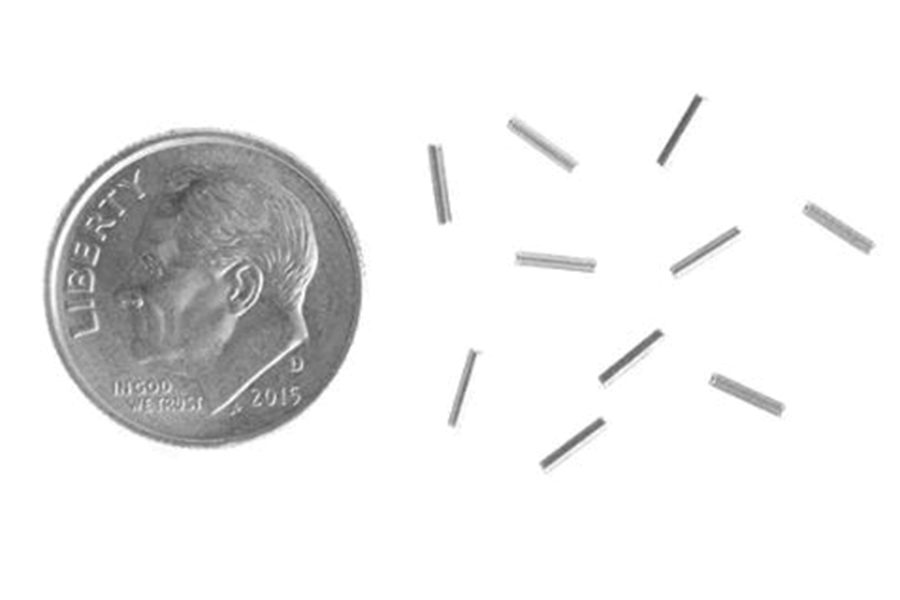
Home » Isoray raises $50M to expand Cesium-131 cancer treatments
Isoray raises $50M to expand Cesium-131 cancer treatments

June 14, 2021

Isoray Inc., the Richland company that makes radioactive seeds to treat prostate cancer, has raised more than $50 million through supplemental stock offerings in recent months, with most targeted to expand its reach to other types of cancer.
Isoray (NYSE American: ISR) raised nearly $10 million in October to fund operations through a pandemic-related slump and $45 million in February.
The latter is funding clinical trials and other costs associated with bringing its proprietary Cesium-131 radiation treatment to brain, head and neck, lung, skin and gynecological cancers that can be treated with implantable radiation devices.
“We see a lot of areas where cancer treatment is changing,” said Lori Woods, chief executive officer.
Isoray produces medical Cesium-131 pellets from isotopes imported from Russia and has 62 employees, with 49 based in Richland. It seals Cesium-131 in titanium tubes marketed as Cesium Blu for implantation at tumor sites.
Prostate cancer is its core business, with about 15,000 patients to date.
For patients, the implantable approach – called “brachytherapy” – eliminates the traditional surgery-followed-by-radiation treatment path.
The Cesium Blu seeds can be arranged by physicians to ensure they are placed exactly where they can deliver radiation treatment directly to the cancer, unlike external beam radiation, which passes through healthy tissue on the way in and out.
Isoray believes its approach is the future of cancer treatment and expanding now puts it at the vanguard.
“It is very personalized. We can personalize to exactly what the doctor wants for that particular patient and that particular cancer,” Woods said.
The company holds four U.S. patents that cover the process of making Cesium-131, making it the world’s only manufacturer. It touts Cesium-131 for its one-two cancer-killing combination of high energy and a short half-life. Cesium-131 hits cancer cells harder and dissipates faster than rival isotopes such as Iodine-125, the company said.
Cesium-131 has a 9.7-day half-life, delivers 90% of its the dose in 33 days and is undetectable in the body after 97 days. In contrast, Iodine-125 has a 60-day half-life, takes 204 days to reach 90% of the dose and is undetectable in the body after 600 days, according to a May presentation to investors.
Oncologists like brachytherapy because they can deliver higher doses to the cancer site than they can with external beam radiation.
“We use it all the time in prostate cancer,” said Dr. Sherry Zhao, a radiation oncologist at the Kadlec Tri-Cities Cancer Center in Kennewick. Brachytherapy lends itself best to cancer sites surgeons can access without major procedures, but she said there is a need to explore more options.
Isoray, she said, has a cult following among doctors. “I personally have friends who use only the cesium seeds.”
Investors are critical
Investors have a critical role to play as Isoray moves to treat additional types of cancer.
The October offering that raised $10 million improved its cash position in 2020 after sales dropped. In the first months of the Covid-19 pandemic, fewer people visited doctors, leading to fewer cancer diagnoses, treatments and demand.
Woods called the stock offering Isoray’s equivalent to a Paycheck Protection Program loan. The company concluded a federal PPP loan was not appropriate for it. But it faced the same loss of business as most other businesses.
“We needed that money to break even as a company,” she said.
It returned to the market for a second offering in February when it spied an opportunity to raise money to support its expansion plans. The capital markets turned bullish for small companies such as Isoray, aka “micro caps.” Isoray has a market cap of just $113 million, with shares trading at about 86 cents in early June.
According to Kiplinger, the small-cap Russell 200 index outperformed the S&P 500, the Dow Jones Industrial Average and the Nasdaq Composite for the year through mid-April.
“I took the opportunity to say we have an opportunity to raise money to execute on our strategy to take the company to a new level,” Woods said. The board agreed.
Two aces
Isoray has two big advantages as it looks to deploy its Cesium Blu product to blast more types of cancer.
In 2003, the Food and Drug Administration approved Cesium-131 to treat all malignant cancers, not just prostate cancers. That means it does not have to pursue fresh approvals for each new line, although new procedures and devices are subject to approval.
Too, the Centers for Medicare & Medicaid Services, or CMS, is piloting a change in how it reimburses cancer treatment, which Isoray believes will drive interest in its lower-cost approach.
For instance, CMS is expected to provide a flat reimbursement of $20,000 for prostate cancers, making low-cost options such as Cesium Blu more attractive.
It does have to demonstrate that its seeds are appropriate for other types of malignant cancers.
It is working with GT Medical Tech on marrying Cesium-131 with GT’s GammaTile Therapy product to treat brain cancer, with commercialization efforts underway.
As with prostate cancer, brachytherapy could tackle malignant brain tumors faster and with less stress to the patient.
Surgeons remove the tumor, then implant the Cesium Blu seeds in the spot where it was removed to tackle any cancerous cells left behind. Normally, the patient would go home after brain surgery, recover, and then return for additional radiation therapy.
Brachytherapy is a “one and done” approach.
“That’s huge because a lot of these patients aren’t feeling great anyway,” she said. “We’re super excited about the opportunities to impact lives of patients with brain tumors.”
In another study, researchers at the University of Cincinnati are using a combination of Cesium Blu and Keytruda to treat recurrent head and neck cancers. Head and neck cancers are another potentially important market. It’s a tricky area to treat because critical physical structures – the spinal column and throat – pass through the narrow confines of the neck.
Protecting healthy tissue when there is not much to spare is even more critical, particularly if cancers return.
As it eyes additional treatments, Woods said Isoray will not retreat from its core business.
Prostate cancer is a $600 million “industry,” with most early-stage cancers considered highly treatable.
The American Cancer Society estimates one in seven men will be diagnosed with prostate cancer in his lifetime.
The American Cancer Society projects an estimated 250,000 new cases in 34,000 deaths in the U.S. this year. That is a 30% more than normal and is attributed in part to the pandemic and delayed medical care, which delayed diagnoses.
“It was surprising to us how much lack of access has really affected things,” she said. “In some cases, hospitals were just flat out overwhelmed.”
While not every prostate cancer patient is a suitable candidate for Cesium 131, Isoray says its treatment is effective for most.
“There’s lots of clinical support to show Cesium-131 is the right treatment for most patients,” she said.
Breast cancer is not currently a good candidate for the Cesium Blu approach. Woods explained that the fatty nature of breast tissue means the seeds tend to slip around instead of staying put at the cancer site, lessening the impact.
Woods said the company is looking for solutions that will treat breast cancer without creating secondary cosmetic issues like puckering and indentations.
“We haven’t found exactly the right thing yet,” she said.
Pandemic affects supply chain
Isoray sources isotopes from a commercial reactor in Russia. It previously used a U.S.-based reactor but found the Russian isotopes were less expensive and purer than the American counterparts.
Woods, who has visited the supplier on many occasions, said she is not concerned about relying on Russia. It has been a reliable partner that welcomes being paid in U.S. dollars.
“They have been good partners. They have never missed a shipment, not before or during Covid,” she said.
The pandemic did force it to adapt how the isotopes traveled. Commercial flights were canceled, prompting it to develop fall back positions. It shipped via other carriers and cargo flights, which drove up costs, something she said appears to be temporary.
Local News Manufacturing
KEYWORDS june 2021





